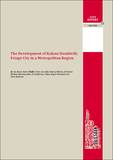|
Economic development is one of the pillars of the sustainable development paradigm, which informs the broad research agenda of this FP7 call. Within Chance2Sustain, the decision to focus on megaproject (MP) development, as opposed to “economic development policies” more generally, was considered a more dynamic point of entry, although efforts were made for each city to situate this particular thrust within the wider policy agenda. Significantly, many of our study cities do not have an explicit political mandate to pursue economic growth, which is considered the prerogative of higher levels of government, provincial or national, South Africa being the notable exception. Notwithstanding, our research has garnered robust evidence to show that most of our cities are situated within a system of governance arrangements that gives increasing priority to economic growth and recognises urban spaces as being increasingly central in that process.
In this respect, our case studies lend empirical support for theoretical propositions, such as urban “entrepreuneurialism” and “state spatial rescaling”, which hypothesize a shift in the scale of mediation between capital and territory from the national scale to urban scales. Our cases suggest however a noteworthy discrepancy with some strands of the international literature that have posited the increased significance of local government within the broader territorial organisation of the state.
|
Recent Chance2Sustain PublicationsMegaprojects and Urban Development in Cities of the South by Loraine Kennedy et al.
Traveling Concepts in Megaproject Building by Loraine Kennedy and Glen Robbins
Sustainable Data Science for Sustainable Cities: Big Data and the Challenge of Urban Development by Linnet Taylor
Participatory Mapping in Informal Settlements: An Instrument for Empowerment, or Exclusion? Reflections from Three Cities in South Africa and India by Catherine Sutherland et al.
Mapping as Tool to Understand Urban Inequalities by Isa Baud and Karin Pfeffer |
|
|
|
|
|

